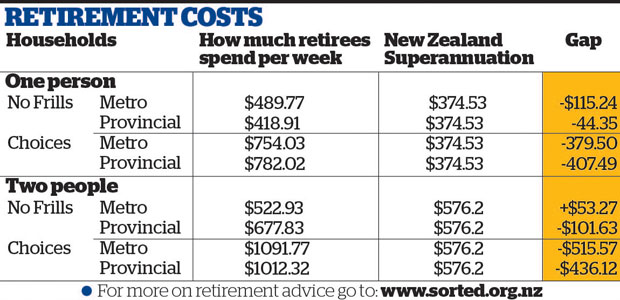- Joined
- Jul 10, 2008
- Messages
- 64,816
- Points
- 113
How much you need in KiwiSaver to be comfortable
7:00 AM Monday Nov 9, 2015

New calculations show NZ retirees won't be able to just use national superannuation if they have ambitions beyond a 'no-frills' lifestyle. Photo / Thinkstock
An Auckland couple would need to have a combined $552,000 in their KiwiSaver funds to have some choices in their retirement, based on the spending of today's retirees.
Westpac Massey University Fin-Ed Centre in conjunction with Workplace Savings has released its latest calculations on how much people currently spend in retirement.
It revealed only couples who live in New Zealand's major cities on a "no-frills" budget are able to get by on New Zealand Superannuation alone.
Massey University researcher Claire Matthews said the figures showed even people living frugally had to top up the government benefit with either savings or income to survive.
"I'm not sure the public actually understand. People don't just live on New Zealand Super. They have either got savings or are still working."
Matthews said the figures showed that people have "got to save" if they want to have a basic standard of living in retirement.
While the $552,000 might seem like a lot of money, Matthews said if people were in KiwiSaver and started saving from a young age it should be achievable.
But it was much harder for those who waited longer.
Calculations from the retirement planner tool on the Sorted.org.nz site showed a single female would need to have $113,216 saved by 65 to live a no frills retirement.
For a 25-year-old that would require saving $46 a week but for a 50-year-old it jumped to $144 a week.
Matthews said it was much easier for the 25-year-old, especially if they were employed and signed up to KiwiSaver, as around half of that money could come from their employer contribution and the government subsidy.
"What it shows is you do need to start [saving] early. The reality is the best time to start is when you start working."
If young people started contributing to KiwiSaver from their first job it would be built into their income expectations, so they would not feel like they were missing out.
But she said it was not too late to do something in your 50s or 60s.

New calculations show NZ retirees won't be able to just use national superannuation if they have ambitions beyond a 'no-frills' lifestyle. Photo / Thinkstock
"It is not too late but it is going to be more difficult."
Matthews said older savers may need to adjust their thinking and consider working beyond 65 if they could manage it.
"It is a mind-set change for New Zealanders. They've got to stop thinking of 65 as the age of retirement." Matthews said if people chose to work beyond 65 they would still get some of their superannuation entitlement which could be used to bolster savings.
Examination of the spending categories revealed housing costs were relatively low, indicating most retirees still lived in a home they owned.
But Matthews said that was likely to change over time based on home-ownership patterns now coming through and some people would need to factor the cost of renting into how much they would need to save.
The other concern in the retirement expenditure data was the finding many retirees did not spend enough on electricity to include the use of heating, she said.
"At some levels there is a struggle to pay for heating and that is a major issue."
7:00 AM Monday Nov 9, 2015

New calculations show NZ retirees won't be able to just use national superannuation if they have ambitions beyond a 'no-frills' lifestyle. Photo / Thinkstock
An Auckland couple would need to have a combined $552,000 in their KiwiSaver funds to have some choices in their retirement, based on the spending of today's retirees.
Westpac Massey University Fin-Ed Centre in conjunction with Workplace Savings has released its latest calculations on how much people currently spend in retirement.
It revealed only couples who live in New Zealand's major cities on a "no-frills" budget are able to get by on New Zealand Superannuation alone.
Massey University researcher Claire Matthews said the figures showed even people living frugally had to top up the government benefit with either savings or income to survive.
"I'm not sure the public actually understand. People don't just live on New Zealand Super. They have either got savings or are still working."
Matthews said the figures showed that people have "got to save" if they want to have a basic standard of living in retirement.
While the $552,000 might seem like a lot of money, Matthews said if people were in KiwiSaver and started saving from a young age it should be achievable.
But it was much harder for those who waited longer.
Calculations from the retirement planner tool on the Sorted.org.nz site showed a single female would need to have $113,216 saved by 65 to live a no frills retirement.
For a 25-year-old that would require saving $46 a week but for a 50-year-old it jumped to $144 a week.
Matthews said it was much easier for the 25-year-old, especially if they were employed and signed up to KiwiSaver, as around half of that money could come from their employer contribution and the government subsidy.
"What it shows is you do need to start [saving] early. The reality is the best time to start is when you start working."
If young people started contributing to KiwiSaver from their first job it would be built into their income expectations, so they would not feel like they were missing out.
But she said it was not too late to do something in your 50s or 60s.

New calculations show NZ retirees won't be able to just use national superannuation if they have ambitions beyond a 'no-frills' lifestyle. Photo / Thinkstock
"It is not too late but it is going to be more difficult."
Matthews said older savers may need to adjust their thinking and consider working beyond 65 if they could manage it.
"It is a mind-set change for New Zealanders. They've got to stop thinking of 65 as the age of retirement." Matthews said if people chose to work beyond 65 they would still get some of their superannuation entitlement which could be used to bolster savings.
Examination of the spending categories revealed housing costs were relatively low, indicating most retirees still lived in a home they owned.
But Matthews said that was likely to change over time based on home-ownership patterns now coming through and some people would need to factor the cost of renting into how much they would need to save.
The other concern in the retirement expenditure data was the finding many retirees did not spend enough on electricity to include the use of heating, she said.
"At some levels there is a struggle to pay for heating and that is a major issue."



